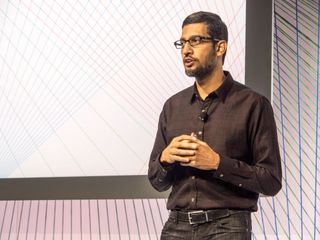Machine learning, AI, post-mobile search lead 2016 Google Founders' Letter

The Founders Letter is a powerful statement for Google. Start with the original "Don't be evil" mission of 2004, to last year's opus that formed Alphabet and marked a major restructuring of Google. Today, in a 2016 Founders' Letter, Alphabet CEO Larry Page hands the virtual pen to Google CEO Sundar Pichai for an update.
"I wanted to give him most of the bully-pulpit here to reflect on Google's accomplishments and share his vision," Page writes, noting that we'll see him, Pichai and Sergey Brin share that space in the future.
Search remains key to everything, Pichai writes. That hasn't changed, and it won't change.
It's easy to take Search for granted after so many years, but it's amazing to think just how far it has come and still has to go. I still remember the days when 10 bare blue links on a desktop page helped you navigate to different parts of the Internet. Contrast that to today, where the majority of our searches come from mobile, and an increasing number of them via voice. These queries get harder and harder with each passing year—people want more local, more context-specific information, and they want it at their fingertips.
Having a stockpile of results is just part of the equation, though. To truly make them useful, you have to be able to work with them. That's where things like machine learning and artificial intelligence will play a big role in the future. (And make no mistake, that future is now.) And the line between your mobile device and a desktop computer — and anything and everything else that's connected — will continue to blur.
A key driver behind all of this work has been our long-term investment in machine learning and AI. It's what allows you to use your voice to search for information, to translate the web from one language to another, to filter the spam from your inbox, to search for "hugs" in your photos and actually pull up pictures of people hugging ... to solve many of the problems we encounter in daily life. It's what has allowed us to build products that get better over time, making them increasingly useful and helpful.
He also mentioned Google's efforts to add more and faster ways to access content, such as launching Accelerated Mobile Pages for faster mobile news sites and YouTube Red, its ad-free version of its video service with original content.
Pichai wrote about how Android now has 1.4 billion active devices, but that it is working to change how we access content via AI assistants:
Looking to the future, the next big step will be for the very concept of the "device" to fade away. Over time, the computer itself—whatever its form factor—will be an intelligent assistant helping you through your day. We will move from mobile first to an AI first world.
Pichai says that Google will continue to create services that will help others worldwide:
Be an expert in 5 minutes
Get the latest news from Android Central, your trusted companion in the world of Android
For us, technology is not about the devices or the products we build. Those aren't the end-goals. Technology is a democratizing force, empowering people through information. Google is an information company. It was when it was founded, and it is today. And it's what people do with that information that amazes and inspires me every day.

